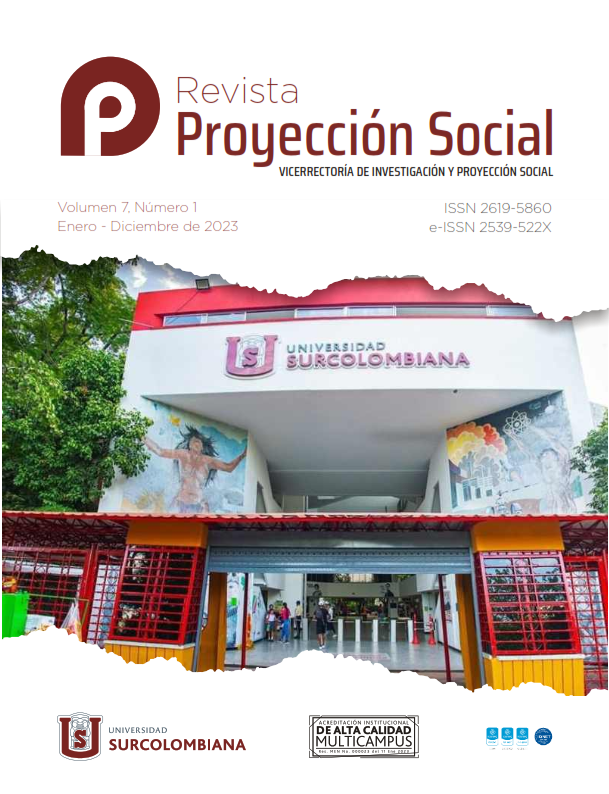Promoción de valores éticos y prácticas de convivencia en estudiantes de décimo grado de una escuela pública del Caquetá-Colombia
##plugins.themes.bootstrap3.article.main##
This article results from a pedagical intervention that aimed to collect students' reflections on ethical values and coexistence practices through the module Democracy and Peace: Duties, which is part of the document entitled Suggested Curriculum, proposed by the Ministry of Education (2016) for the EFL (English as a foreign language) class. We conducted the intervention study at a public school in Puerto Rico – Caquetá, with a population of 29 participants, from 14 to 18 years old. Two main concerns underlying this
initiative are the lack of research related to the effect of the module on ten graders and the influence of the module on students' reflections on ethical values and coexistence practices in an EFL context. The class teacher collected data through student diaries, teacher's field notes, and students' artifacts (posters and dramatizations). Among the salient results are the students' critical reflections highlighting the importance of questioning their ethical values and coexistence practices inside and outside the classroom in favor of a positive transformation. Additionally, the student's commitment to learning English was strengthened, and their linguistic interaction, motivation, and self-awareness improved. The pedagogical approach adopted - project-based learning- proved to be an approach that enabled us to work meaningfully during the pedagogical intervention.
Downloads
##plugins.themes.bootstrap3.article.details##
Aguirre, E. A. (2018). Unlicensed EFL teachers co-constructing knowledge and transforming curriculum through collaborative - reflective inquiry. Profile: Issues in Teachers' Professional Development, 20(1), 73-87 https://doi.org/10.15446/profile.v20n1.62323.
Álvarez Araque, W., Parra, A., & Forero Romero, A. (2022). Educational Multimedia in the Appropriation of Ethical Values and the Improvement of School Coexistence. Journal of Positive Psychology and Wellbeing, 1403-1419. https://www.journalppw.com/index.php/jppw/article/view
/11048 Ausubel, D. P. (1963). The psychology of meaningful verballearning.
Ball, I, & Perry, C (2011). Differences in student engagement: investigating the role of the dominant cognitive processes preferred by engineering and education students. Education research international, 2011, 1-8. https://doi.org/10.1155/2011/414068
Bello, I. (2012). A Language-in-Use Study of EFL Students' Social Discourses in Project- Based Learning. Colomb. Appl. Linguist. J. ISSN 0123-4641 o Bogotá, Colombia. Pages 108126. http://www.scielo.org.co/scielo.php?pid=S012346412012000100008&script=sci_arttext&
tlng=en
Brown, J.D. (2001). Using Surveys in Language Programs. Cambridge, UK: Cambridge University Press.
Coates, H. (2007). A model of online and general campus-based student engagement. Assessment and Evaluation in Higher
Education, 32(2). https://www.tandfonline.com/doi/full/ 10.1080/02602930600801878
Contreras, J. J., & Chapetón, C. M. (2016). Cooperative Learning With a Focus on the Social: A Pedagogical Proposal for the EFL Classroom. https://doi.org/10.19183/how.23.2.321
Creswell, J. W. (2012). Educational Research: Planning, conducting and evaluating quantitative and qualitative research, 4th edition. Boston: Person.
Creswell, J. W. (2014). Research Design. Qualitative, Quantitative and Mixed Methods.
Ferris, D. and Tagg, T. (1996). "Academic oral communication needs of EAP learners: What subject-matter instructors actually require." TESOL Quarterly, 30, pp. 31-58. https://onlinelibrary.wiley.com/doi/abs/10.2307/3587606Ghaye, T. (2011). Teaching and learning through reflective
practice. Routledge.
Goetz, J.P.& LeCompte, M. D. (1984). Ethnography and qualitative design in educational Gómez et al., (2013). Social Values Reflections Through the Use of EFL Storytelling: An Action Research with Primary Students. HOW Journal, 20(1), 73-89. https://www.howjournalcolombia.org/index.php/how/article/view/24
Heredia, et al. (2014) Study of citizen competences among students of a private university in Mexico. Academic and Business Research Institute. https://eric.ed.gov/?id=EJ 1064091
Johnston, W. (2003). Values in English Language Teaching.London, Lawrence Erlbaum.
Knapp, C. E. (1992). Lasting lessons: A teacher's guide to reflecting on experience. Charleston, WV: ERIC Clearing house on Rural Education and Small Schools.
Lopez et al., (2014). Escala de clima escolar: Adaptacion al espanol y validacion en estudiantes chilenos [School climate scale Spanish adaptation and validation of Chilean students]. Universitas Psychologica, 13, 1111-1122.
doi:10/11144/Javeriana.UPSY13-3.ecea Lopez M, R., & Garcia R, L. (2006). Convivir en la escuela. Una aproximación reflexiva a sus fundamentos pedagógicos [To coexist in school: A reflexive approach to its pedagogical foundations]. Revista Pedagogia y Saberes, 24, 85-97.
http://repositorio.pedagogica.edu.co/handle/20.500.12209/7621
Mihardi, S. 2013. Effect of Project Based Learning Model With KWL (Know-Want-Learn) Worksheet on Creative Thinking
in Solved Physics Problems. Thesis in State University of Medan (Unimed). Indonesia, Medan: Universitas Negeri
Medan. http://digilib.unimed.ac.id/4205/
Ministerio de Educación Nacional [MEN]. (2004). Estándares básicos de competencias ciudadanas: Formar para la ciudadanía… ¡sí es posible! Bogotá: Ministerio de Educación Nacional.
Ministerio de Educación Nacional, MEN. (2016). Pedagogical principles and guidelines: Suggested English curriculum, 6th to 11th grades. Bogotá, CO: Author. Retrieved from https://aprende.colombiaaprende.edu.co/sites/default/files/naspublic/Anexo%2013%20Suggested%20
Structure.pdf
Mohammad, M. (2010). Using Drama Activities and Techniques to Foster Teaching English as a Foreign Language: A Theoretical Perspective.
Muhammed, A. A. (1994). The Foundations of Administrative Thoughts in Islam, Wahba Publisher, Cairo.
Piaget, J. (1934). Remarques psychologiques sur le selfgovernment [Psychological observations on selfgovernment].In J. Heller (Ed.), Le self-government à l'école [Self-government in school] (pp. 89-108). Geneva, CH:
Bureau international d'éducation. Ramirez, O. (2007). Incorporating Values into the English Classroom. HOW 14, 2007, ISSN 0120-5927. Bogotá,
Colombia. research. New York: Academic Press. https://www.howjournalcolombia.org/index.php/how/article/view/95
Richards, J. C. & Farrell, T. (2005). Professional Development for Language Teachers. CamSystematic Review of Primary Methodological Studies. Hispanic Journal of B e h a v i o r a l Sciences,bridge Language Education.
Rocha et al., (2019). Measuring School Climate Among SpanishSpeaking Students: A Systematic Review of Primary
Methodological Studies. Hispanic Journal of Behavioral Sciences,41(4),464–480. https://doi.org/10.1177/073998 6319880224
Sari, N. (2013). The importance if teaching moral values to the students. Journal of English and Education, 154-162.
Thomas, J. W. (2000). A review of research on PBL. Retrieved from http://www.bobpearlman.org/BestPractices/PBL_Research.pdf
Ursula, L., & Jan H., (2004) Supporting student awareness: understanding student preconceptions of their subject
matter within introductory courses, Innovations in Education and Teaching International, 41:4, 459-471, DOI:
1080/1470329042000277039
Vallori, A. B. (2014). Meaningful learning in practice. Journal of education and human development, 3(4), 199-209. http://dx.doi.org/10.15640/jehd.v3n4a18



